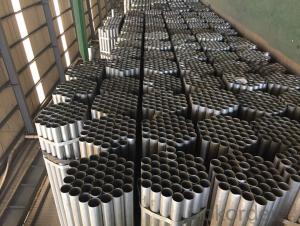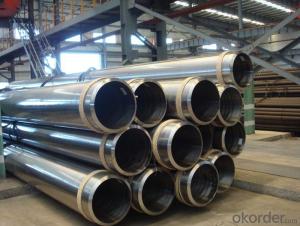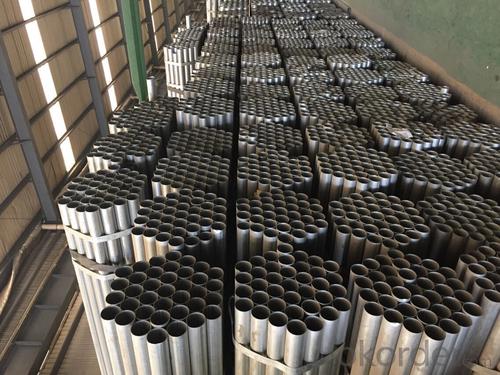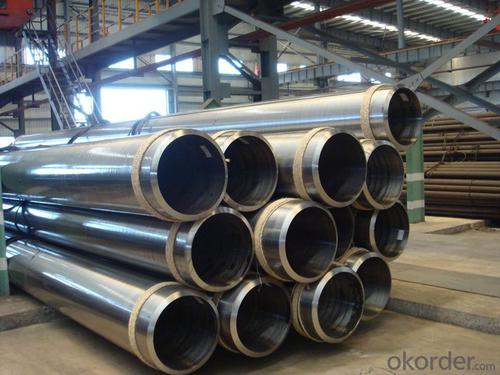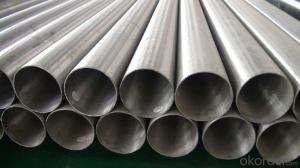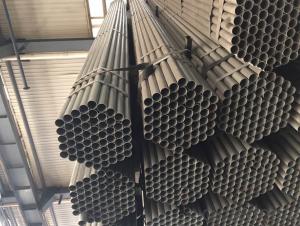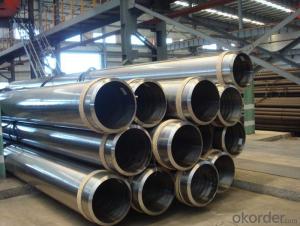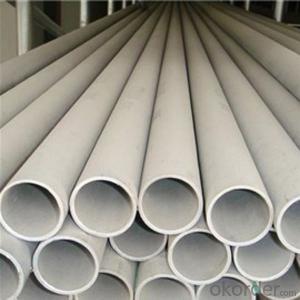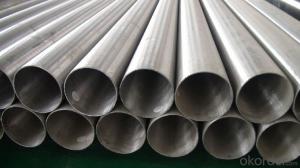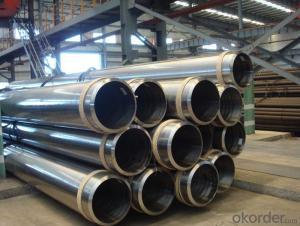Stainless Steel Welded Pipe ASTM A358/A312
- Loading Port:
- China main port
- Payment Terms:
- TT or LC
- Min Order Qty:
- 25 m.t.
- Supply Capability:
- 40 m.t./month
OKorder Service Pledge
OKorder Financial Service
You Might Also Like
1、Structure of /Stainless Steel Welded Pipe ASTM A358/A312Description:
Stainless steel welded pipe is actually a cover term, covering a wide range of alloy and making them suitable for different attributes that are used in a very wide and large numbers of different industries.. It can be molded, rolling, and it can create amazing shapes to make it perfect, It is used as experimental buildings, The use of steel pipe welding of large stainless steel covers other examples.
2、Main Features of the Stainless Steel Welded Pipe ASTM A358/A312:
• High manufacturing accuracy
• High strength
• Small inertia resistance
• Strong heat dissipation ability
3、Stainless Steel Welded Pipe ASTM A358/A312Images:
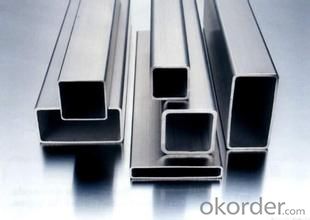
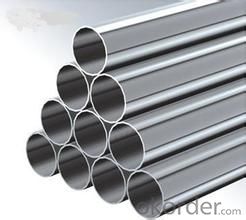
4、Stainless Steel Welded Pipe ASTM A358/A312/A778 Specification:
Size:
| Outside diameter | Outside | Thickness | ||||
| SCH 5S | SCH 10S | SCH 20S | SCH 40S | |||
| (A) | (B) | mm | mm | mm | mm | mm |
| 350 | 14′ | 355.6 | 3.96 | 4.78 | 7.92 | 11.13 |
| 400 | 16′ | 406.4 | 4.19 | 4.78 | 7.92 | 12.7 |
| 450 | 18′ | 457.2 | 4.19 | 4.78 | 7.92 | 14.27 |
| 500 | 20′ | 508 | 4.78 | 5.54 | 9.53 | 15.09 |
| 550 | 22′ | 558.8 | 4.78 | 5.54 | 9.53 | 15.09 |
| 600 | 24′ | 609.6 | 5.54 | 6.35 | 9.53 | 17.48 |
| 650 | 26′ | 660.4 | 5.54 | 7.92 | 12.7 | 17.48 |
| 700 | 28′ | 711.2 | 5.54 | 7.92 | 12.7 | 17.48 |
| 750 | 30′ | 762 | 6.35 | 7.92 | 12.7 | 17.48 |
| 800 | 32′ | 812.8 | 7.9 | 12.7 | 17.48 | |
| 850 | 34 | 863.6 | 7.92 | 12.7 | 17.48 | |
| 900 | 36′ | 914.4 | 7.92 | 12.7 | 19.05 | |
| 1000 | 40′ | 1016 | 9.53 | |||
Tolerances on dimensions table:
| Standard | Outside(mm) | Thickness(mm) | Length(mm) | |
| ASTM A312 | ≤48.26 | -0.4 | +No special provisions(Unspecified)-12.50% | Appoint LengthDefinite cut length+6.40 |
| >48.26~114.30 | 0 | 0 | ||
| >114.30~219.08 | 0.8 | |||
| >219.08~457.20 | 1.6 | |||
| >457~660 | -4 | |||
| >660~864 | -5 | |||
| >864~1219 | -5.6 | |||
| JIS G3459 | <30.00 ±0.30≥30.00 ±1.00% | <2.00 ±0.20≥2.00 ±10% | Appoint LengthDefinite cut Length | |
| GB/T 12771 | <13.00 ±0.2013.00~40.00 ±0.30≥40.00 ±0.80% | ≤4.00 +0.50 -0.60>4.00 ±10% | 20 | |
| EN 10217-7 | D1±1.50% with±0.75mm(min)D2±1.00% with±0.50mm(min)D3±0.75% with±0.30mm(min) | T1±15.00% with±0.60mm(min)T2±12.5% with±0.40mm(min)T3±10.00% with±0.20mm(min) | ≤6000 +5.00 -06000~12000 +10.00 -0 | |
| D4±0.5% with±0.10mm(min) | T4±7.50% with±0.15mm(min) | |||
| T5±5.00% with±0.10mm(min) | ||||
| EN ISO 1127 | ||||
5、FAQ of Stainless Steel Welded Pipe ASTM A358/A312/A778:
①How is the quality of your products?
Our products are manufactured strictly according to national and internaional standard, and we take a test on every pipe before delivered out. If you want see our quality certifications and all kinds of testing report, please just ask us for it.
Guaranteed: If products’ quality don’t accord to discription as we give or the promise before you place order, we promise 100% refund.
②How about price?
Yes, we are factory and be able to give you lowest price below market one, and we have a policy that “ for saving time and absolutely honest business attitude, we quote as lowest as possible for any customer, and discount can be given according to quantity”,if you like bargain and factory price is not low enough as you think, just don’t waste your time.Please trust the quotation we would give you, it is professional one.
Any question, pls feel free to contact us !
- Q: Are steel tubes and round steel in weight or length when purchased?
- The price must be measured by weight, and the length, volume and other specifications should be entered
- Q: What are the different methods of repairing steel pipes?
- There are several methods of repairing steel pipes including welding, pipe wrapping, epoxy lining, and pipe bursting. Welding involves joining the broken sections of the pipe using heat and a filler material. Pipe wrapping involves applying a layer of epoxy or fiberglass wrap around the damaged area to reinforce and seal it. Epoxy lining involves applying a coating of epoxy resin on the interior of the pipe to prevent corrosion and restore structural integrity. Pipe bursting is a more invasive method where a new pipe is pulled through the existing damaged pipe, breaking it apart and replacing it in the process.
- Q: Are steel pipes suitable for use in sewage treatment plants?
- Yes, steel pipes are suitable for use in sewage treatment plants. Steel pipes are durable, corrosion-resistant, and can withstand high-pressure applications, making them an ideal choice for transporting and containing sewage in treatment plants. Additionally, steel pipes can be easily welded, allowing for seamless connections and minimizing the risk of leaks or contamination.
- Q: How are steel pipes used in power plants?
- Steel pipes are used in power plants for various purposes such as carrying steam, water, and other fluids, as well as transporting fuel and exhaust gases. They are also utilized in the construction of boilers, heat exchangers, and condensers, ensuring efficient and reliable operation of power generation equipment.
- Q: What's the actual size of the DN25?
- DN25 refers to the theoretical size of the inner hole of the pipe. That is to say, the theoretical dimension of the inner diameter of the pipe is 25 (the metric tube refers to the inner diameter, and the English tube is also to indicate the inner diameter, for example: 3/8, the inner diameter is 9.525, and the diameter of the 1/2 is 12.7, and the diameter of the 5/8 is 15.875). The outer diameter is theoretical in diameter, plus the wall thickness specified by the state (which is artificially specified and has no formula)The theoretical diameter of DN25 is 25, and the outer diameter is Phi 33.7 and phi 32(but there is also the outside diameter of the mark. The mark is: the outer diameter * wall thickness, such as: 32 * 2, that is to say, the outer diameter is 30, the inner diameter is 26)
- Q: What is the difference between standard wall thickness and extra-strong wall thickness steel pipes?
- The difference between standard wall thickness and extra-strong wall thickness steel pipes lies in the thickness of the pipe walls. Standard wall thickness pipes have a thinner wall compared to extra-strong wall thickness pipes, which have a thicker wall. The increased wall thickness in extra-strong pipes enhances their strength and durability, making them suitable for applications that require higher pressure or load-bearing capacities.
- Q: What is galvanized steel pipe?
- Galvanized steel pipe is a type of steel pipe that has been coated with a protective layer of zinc to prevent rusting and corrosion. This coating helps to extend the lifespan of the pipe, making it suitable for various applications, including plumbing, construction, and outdoor structures.
- Q: What are the factors affecting the durability of steel pipes?
- There are several factors that can affect the durability of steel pipes. These include corrosion, temperature fluctuations, mechanical stress, and exposure to chemicals or abrasive materials. Additionally, the quality of the steel used in the pipes, the design and construction of the piping system, and proper maintenance and inspection practices can also impact their durability.
- Q: What are the advantages of using stainless steel pipes?
- There are several advantages of using stainless steel pipes. Firstly, stainless steel is highly resistant to corrosion, making it suitable for various applications where exposure to moisture or harsh environments is a concern. Secondly, stainless steel pipes have excellent strength and durability, allowing them to withstand high pressures and temperature fluctuations. Additionally, stainless steel is hygienic and easy to clean, making it ideal for applications in the food and beverage industry. Lastly, stainless steel pipes are aesthetically pleasing and can be easily integrated into different architectural designs.
- Q: How are steel pipes used in transportation?
- Steel pipes are commonly used in transportation for various purposes. They are used in the construction of pipelines for transporting fluids, such as oil, gas, and water, over long distances. Steel pipes are also utilized in the manufacturing of vehicle components, including exhaust systems, chassis, and suspension parts. Additionally, steel pipes can be found in infrastructure projects like bridges and tunnels, providing structural support for transportation networks.
Send your message to us
Stainless Steel Welded Pipe ASTM A358/A312
- Loading Port:
- China main port
- Payment Terms:
- TT or LC
- Min Order Qty:
- 25 m.t.
- Supply Capability:
- 40 m.t./month
OKorder Service Pledge
OKorder Financial Service
Similar products
Hot products
Hot Searches
Related keywords
